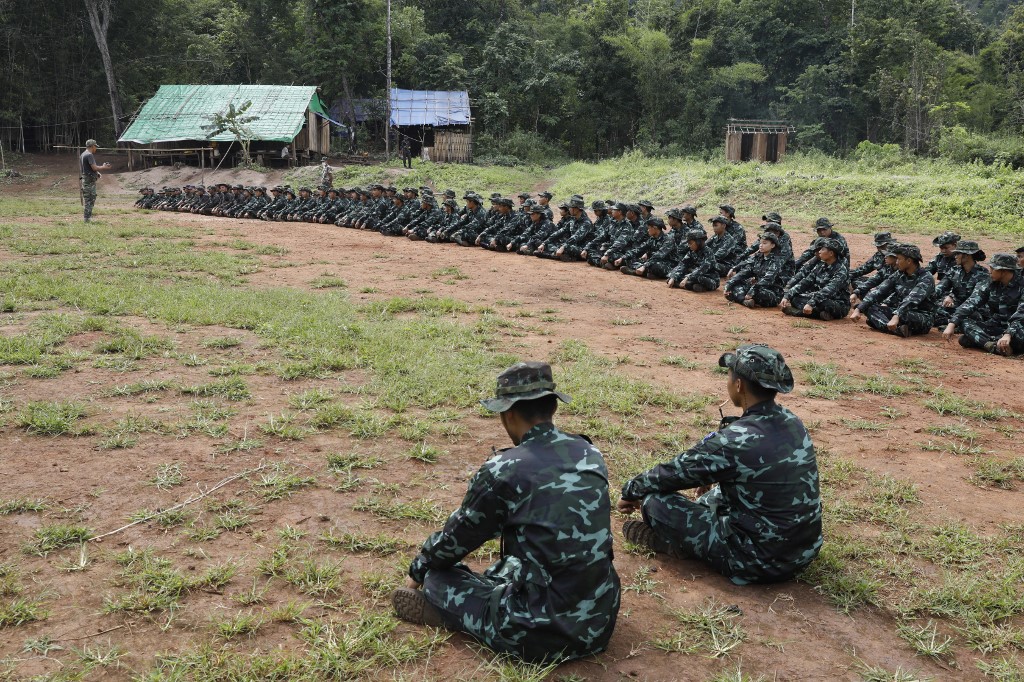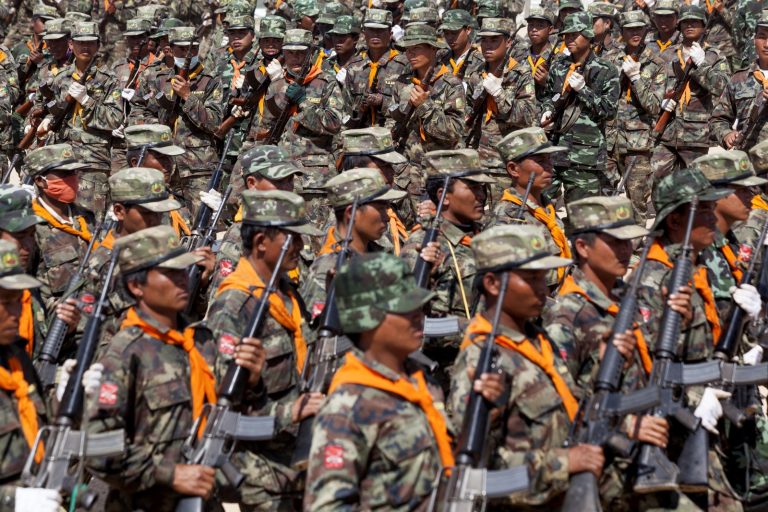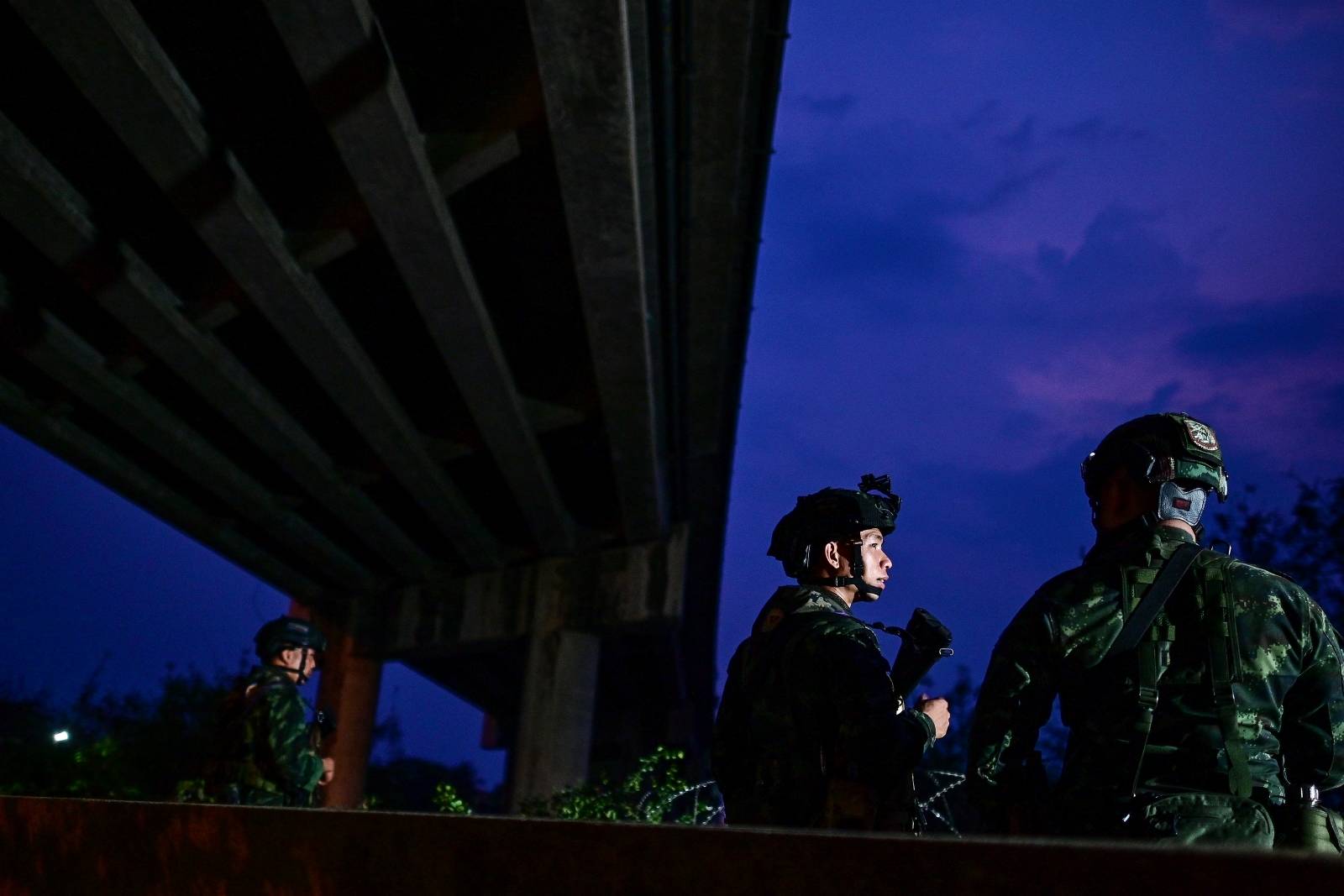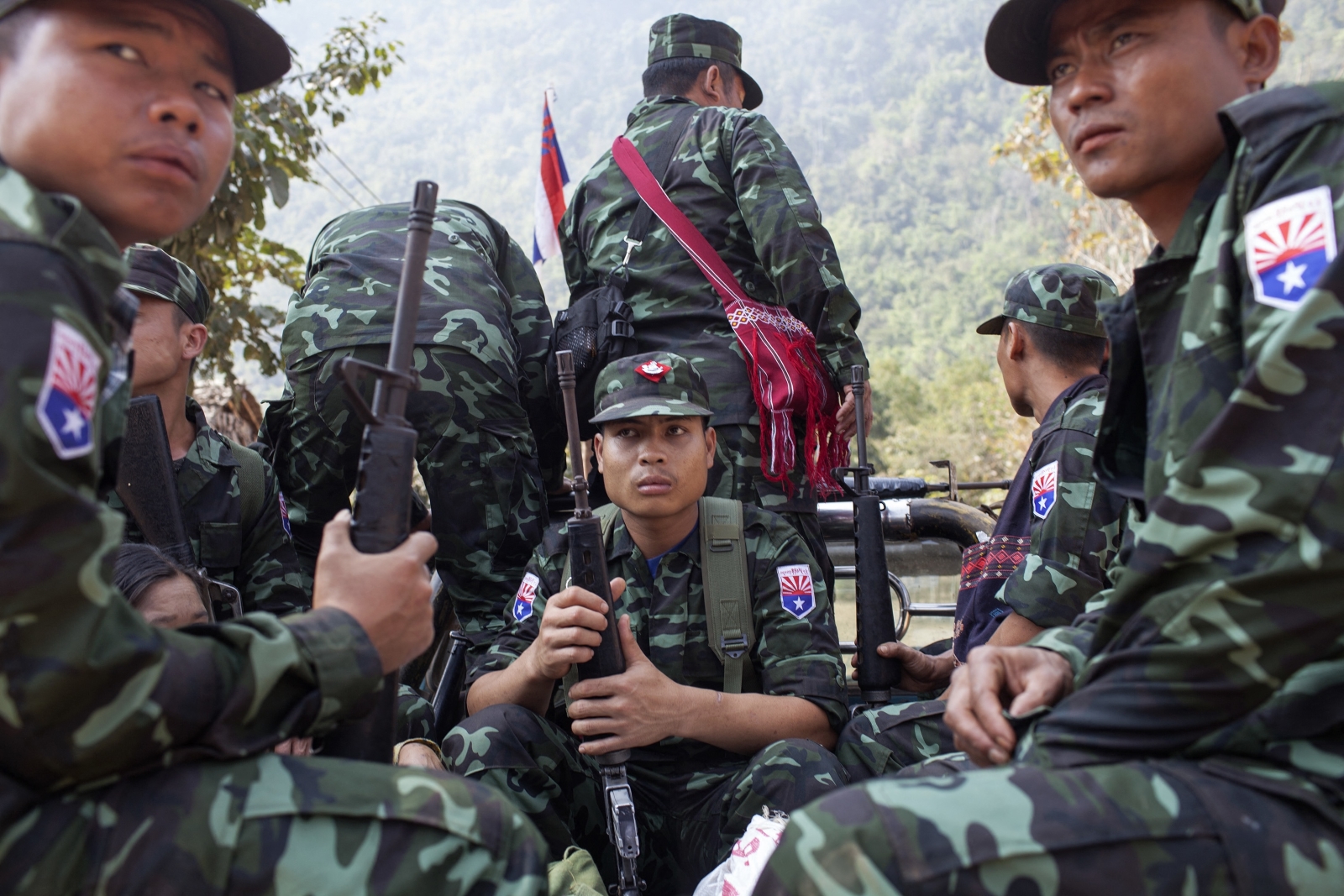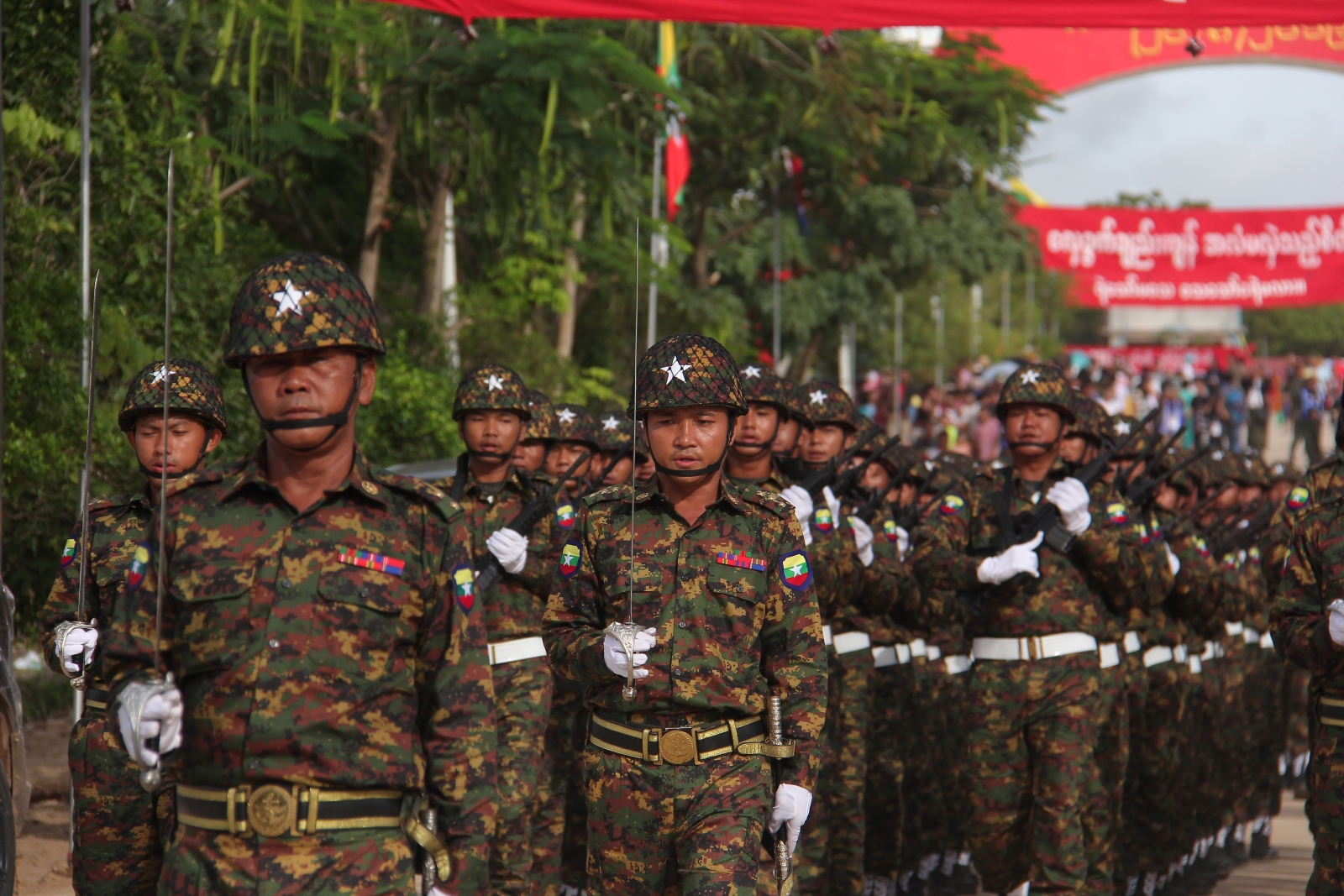Some pro-democracy activists who fled to territory controlled by the Karen National Union for training to fight the junta say they became victims of forcible recruitment, while others are upset at the NUG for failing to provide them with weapons.
By FRONTIER
When police in U Okkar’s hometown in central Mandalay Region brought criminal charges against him for leading protests against the coup, the 39-year-old decided to flee to the “liberated area” of the Karen National Union.
Okkar (not his real name) said he and some fellow activists underwent a month of training and took part in three battles against regime forces alongside the 6th Brigade of the Karen National Liberation Army – the KNU’s armed wing – to gain combat experience.
They are among thousands who responded to the junta’s bloody crackdowns on pro-democracy demonstrations by travelling to areas controlled by ethnic armed groups for training so they can wage armed struggle against the Myanmar military.
“Despite the difficulties, I made my way to the 6th Brigade area in Dooplaya District,” he told Frontier on October 15, using the Karen name for Kayin State’s southern Kawkareik District. “We need experience to fight the Tatmadaw. It’s impossible to fight the military without experience, even if we have weapons.”
After their training, most left KNU territory to join one of the many People’s Defence Force groups or other guerilla resistance outfits that have emerged throughout the country to fight the regime. The training they received in the use of explosives has enabled the revolutionaries to build bombs or make improvised explosive devices, which are being deployed with increasing frequency and effectiveness against regime or military-linked targets throughout Myanmar.
But for some of those who received military training in areas controlled by the Karen National Union, the experience ended with bitterness and frustration.
After that initial month, Okkar and his fellow trainees received commando training from the KNU-KNLA Peace Council, led by a captain in the Karen National Defence Organisation. The KNDO is one of two armed wings of the KNU, the other being the KNLA. Although the KNU-KNLA Peace Council is considered a separate entity to the KNU, Okkar said one of its battalions based close to 6th Brigade works with the KNLA.
However, instead of being able to join a PDF after his training, Okkar said that his trainers tried to force him and some of his fellow trainees to pledge allegiance to 6th Brigade instead.
“When I refused, a captain accused me of being a dalan (informer) and threatened to kill me,” Okkar said. On September 19, a few days after being taken to a KNU village, Okkar and three others tried to escape. They were caught and badly beaten by a captain.
“My jaw was broken, and it is painful to eat,” he said. “When I decided to fight against the military, I was prepared to sacrifice my life. But I didn’t want to join the KNU. I just wanted to learn from them.”

Eventually, Okkar and the others were able to make contact with PDFs that reported their plight to the National Unity Government and KNU headquarters. They were released after nearly two months of forced service and in early October joined a PDF based in the Kayin State township of Myawaddy, on the border with Thailand.
“I am still in their area … When KNU headquarters gave the order for me to be released, no one could touch me,” Okkar said. “I gave up my life and my family to fight the dictatorship, but unfortunately, I met with dictators.”
Another trainee, Ko Aung Thu, 20, who is from Ayeyarwady Region and received training from the KNLA’s 5th Brigade, had a similar experience. He tried to escape but was also caught and beaten for refusing to join the KNU.
The beating left Aung Thu, not his real name, with a hip injury for which he needed treatment at a hospital in Mae Sot, the Thai border town opposite Myawaddy. After recovering from his injury, he joined a PDF in Ayeyarwady Region.
Asked about the forced recruitment, the KNU did not deny that it was occurring but played down the seriousness of the problem.
The KNU’s head of foreign relations, Padoh Saw Taw Nee, said that while these issues are “common”, they were not out of control. “Burmans from the mainland came to our area in 1962 and 1988 under various political circumstances. We already have the experience to solve such issues to prevent them from reaching a very serious stage,” he said.
“Many joined the KNU voluntarily,” he added. “It was their choice.”
Four other trainees interviewed by Frontier said that they were invited to join the KNLA after their training period, but were neither pressured nor mistreated. They said they declined because they knew they would not be allowed to leave the KNU, but added that some had enlisted after being told that they could resign when the revolution ends.
But forced recruitment is only one problem for trainees in ethnic armed group territory. Ko Zarni, 26, who joined a PDF in Yangon after being trained by the KNU, said as many as 40 percent of those who travelled to 6th Brigade territory for training have still not returned, either because they enlisted in the KNLA or it was not safe for them to go back to their hometowns.
Zarni said living conditions were tough and the trainees who had enlisted in the KNLA were often assigned to serve on the front lines, where there are no internet or telephone connections and the food is poor.
“Many are surviving with financial support sent from individuals local and aboard,” he said
Frustration with the NUG
Most fighters interviewed by Frontier said they do not blame the KNU for these problems. Instead, they say the NUG is responsible, because it has been unable to provide them with weapons and has been slow to build relations with PDFs.
Among the activists who have sought training from the KNU there are those who want to join PDFs and those who want to form independent armed resistance groups. However, after months of training from the KNU, they remain idle because they are waiting to receive weapons from the NUG or another provider.
“How can we fight without weapons?” asked one activist who trained with the KNLA in Hpapun District and asked to remain anonymous. He said he originally wanted to start an independent PDF, but was not able to do so due to a lack of weapons and funding. Instead of sitting around, he decided to join the KNLA in order to get combat experience.
“The NUG is the main body to tackle these issues. However, it is weak at strategy and implementing policy. We have not received any instruction for further attacks since it declared a people’s defensive war on September 7,” said Zarni.
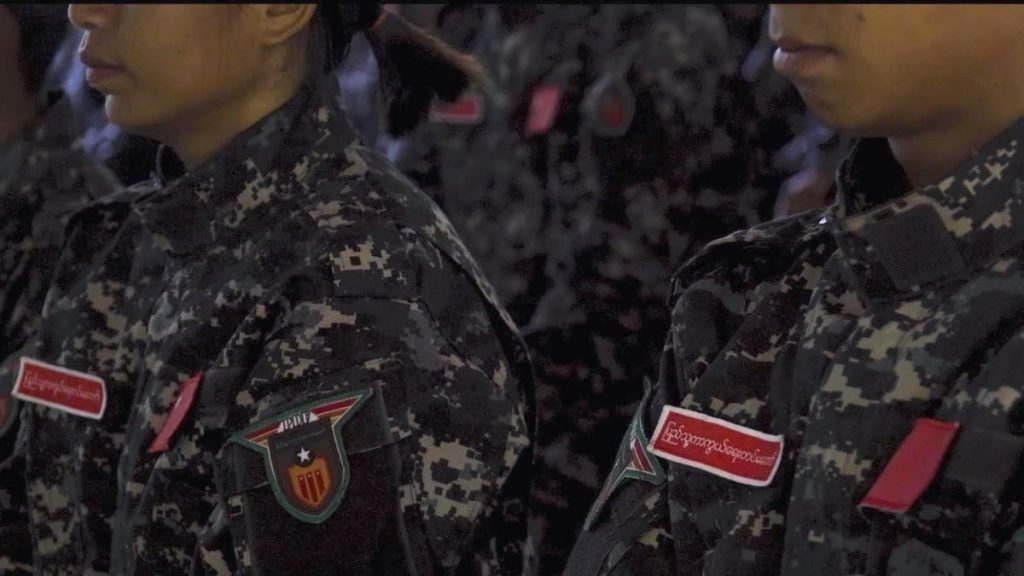
Though the NUG has formed a Ministry of Defence, it has struggled to establish command and control over resistance forces. Only a small number of the hundreds of PDFs and guerrilla forces across the country are explicitly taking direction from the ministry.
In recent weeks, NUG Minister for Defence U Yee Mon has told journalists that the ministry is focusing on combining the numerous PDF chapters across the country and setting up a chain of command.
On October 28, Ministry of Defence permanent secretary Naing Htoo Aung told journalists that the NUG was establishing a Central Command and Coordination Committee comprising NUG officials responsible for defence and security, and the leaders of unspecified ethnic armed groups. The NUG’s regional commands and battalions will be managed under the committee, which has been dubbed “C3C”.
In the first weeks of November, the NUG-controlled PDFs launched their first attacks on regime forces.
The NUG’s Minister for Immigration and Home Affairs, U Lwin Ko Latt, said during a press conference on November 16 that the NUG is coordinating with ethnic armed groups to establish connections with other PDFs, many of which were trained by the armed groups. “We are now working extensively on a people’s defensive strategy. There are many PDF groups across the country. We are trying to connect with them [PDFs] both in terms of policy and support. With the support of the international community, we can now provide support to some extent,” he said.
Local outlets also reported on November 15 that the NUG is implementing “Project A1”, under which various PDFs and former Tatmadaw soldiers are collaborating to create weapons. If successful, this would mean revolutionary forces can access weapons at one-sixth the cost of purchasing them, an A1 member told Frontier.
At the press conference, Lwin Ko Latt said that the NUG is hoping to raise funds through tax collection so it can provide further support to PDFs. “We will be able to provide momentum as the budget increases. It is currently being implemented,” he said.
Frontier contacted the NUG multiple times to ask about these plans, but did not receive a reply.
Many who have received training and are eager to fight are tired of waiting, however.
Okkar said he is still hopeful he will be able to get weapons so he can launch attacks in his Mandalay Region home town, but doesn’t know how long he will have to wait.
“Until the NUG is able to provide more logistical support to the PDF groups,” he said, “many activists eager to put newly-acquired military skills to use in the struggle against dictatorship will likely endure more tough times and idle days in jungle camps.”


